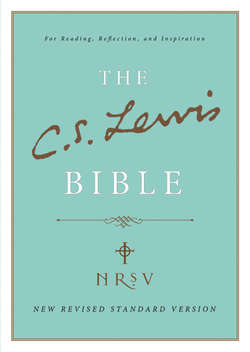Читать книгу C. S. Lewis Bible: New Revised Standard Version - Клайв Льюис, Клайв Стейплз Льюис - Страница 9
INTRODUCTION C. S. LEWIS AND THE BIBLE
Оглавлениеby Jerry Root
As a liberally educated Oxford don and later Cambridge professor, C. S. Lewis was well aware of the fact that to understand Western culture—let alone culture in general—one ought to know the Bible. He believed that no other book had such a profound influence on the literature of the world as this one book, for even the Quran instructed its followers to know the Gospels and the Psalms. He clearly saw the profound value of the Bible as a religious book and wrote,
Unless the religious claims of the Bible are again acknowledged, its literary claims will, I think, be given only “mouth honour” and that decreasingly. For it is, through and through, a sacred book. . . . It demands incessantly to be taken on its own terms: it will not continue to give literary delight very long except to those who go to it for something quite different.2
Once Lewis became a theist, even before he became a Christian, he began his lifelong practice of daily Bible reading. For Lewis, Bible reading was as natural to his daily routine as eating or sleeping. From the time of his conversion, the atheist turned Christian most often read passages prescribed in the Anglican prayer book, but his method of reading, study, and meditation varied. Sometimes he simply read from cover to cover the King James Version (also known as the Authorized Standard Version) or the Moffat translation; and as a medievalist he was also familiar with the Coverdale Bible. Sometimes, as his published letters indicate, he would focus for a time on a particular book of the Bible such as Romans or the Psalms. Often, as a trained classical scholar he would read frequently from the Greek text of the New Testament. No matter what section of the Bible captured his attention at any given time, this one thing must be said about Lewis: he was a man of the Book. Toward the end of his life Lewis was asked what he thought of the practice of daily devotions. He answered,
We have our New Testament regimental orders upon the subject. I would take it for granted that everyone who becomes a Christian would undertake this practice. It is enjoined upon us by Our Lord; and since they are His commands, I believe in following them. It is always just possible that Jesus Christ meant what He said when He told us to seek the secret place and to close the door.3
Lewis faithfully got into the Bible each day, and it is clear from all he wrote that the Bible got into him. In his writing, Lewis sought to focus on what he called “mere Christianity”—that is, those things most central to Christian faith and teaching, and that which is most central to the Bible. From the Scriptures, all that is essential to faith and practice is drawn. As spiritual questions arise out of the text, Lewis intersected with those questions and developed profound apologetics for the faith, including his well-known commentary on whether Jesus was a “liar, lunatic, or the Son of God.”
